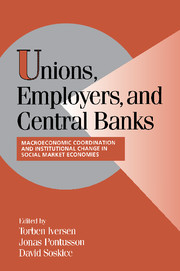9 - Public-Sector Unions, Corporatism, and Wage Determination
from Part III - Macroeconomic and Distributive Outcomes
Summary
A central tenet of the corporatism literature is that the Phillips curve trade-off between inflation and unemployment is mitigated in countries with powerful and centrally coordinated organized labor movements. Most empirical studies, however, are based on data about labor market institutions from the early 1970s and refer to macroeconomic outcomes in the decade following the first OPEC oil shock in 1973. Recent case studies, in contrast, suggest that corporatism broke down during the 1980s in its Scandinavian bastions, in a cycle of strikes, inflation, and ultimately higher unemployment (Iversen 1996; Pontusson and Swenson 1996). We argue that one important reason for the apparent economic problems of strong labor regimes in recent years has been the growth of publicsector unions. So long as public-sector unions are not “too strong” (this limit is estimated empirically), corporatist institutions continue to promote both price stability and low rates of unemployment.
Encompassing labor movements - those that cover large sections of the work force in a relatively small number of independent unions and in which authority is concentrated in the hands of leaders of a single trade union confederation — provide an organizational structure that is conducive to low inflation and low unemployment because they mitigate distributional conflict among all workers. There is a limit, however, to the ability of encompassing labor movements to perform this role. Where public-sector unions are extremely strong (as has recently been the case in Scandinavia), confederation leaders cannot stop public-sector workers from using their organizational power to bid up their wages to levels that have deleterious consequences for the private sector - and especially for those industries that are exposed to international trade.
This chapter relies on three recent systematic studies of labor movements in Organization for Economic Development and Cooperation (OECD) countries that allow us to test the labor market institutions-performance nexus more precisely than has hitherto been the case. We use Visser's (1991) data on publicsector unions, Golden and Wallerstein's (1995) analysis of the structural attributes of organized labor movements, and Traxler's (1994) study of the coverage of collectively bargained wage contracts. These data sources allow us to construct time-sensitive measures of theoretically important attributes of organized labor movements.
- Type
- Chapter
- Information
- Unions, Employers, and Central Banks , pp. 267 - 291Publisher: Cambridge University PressPrint publication year: 2000



